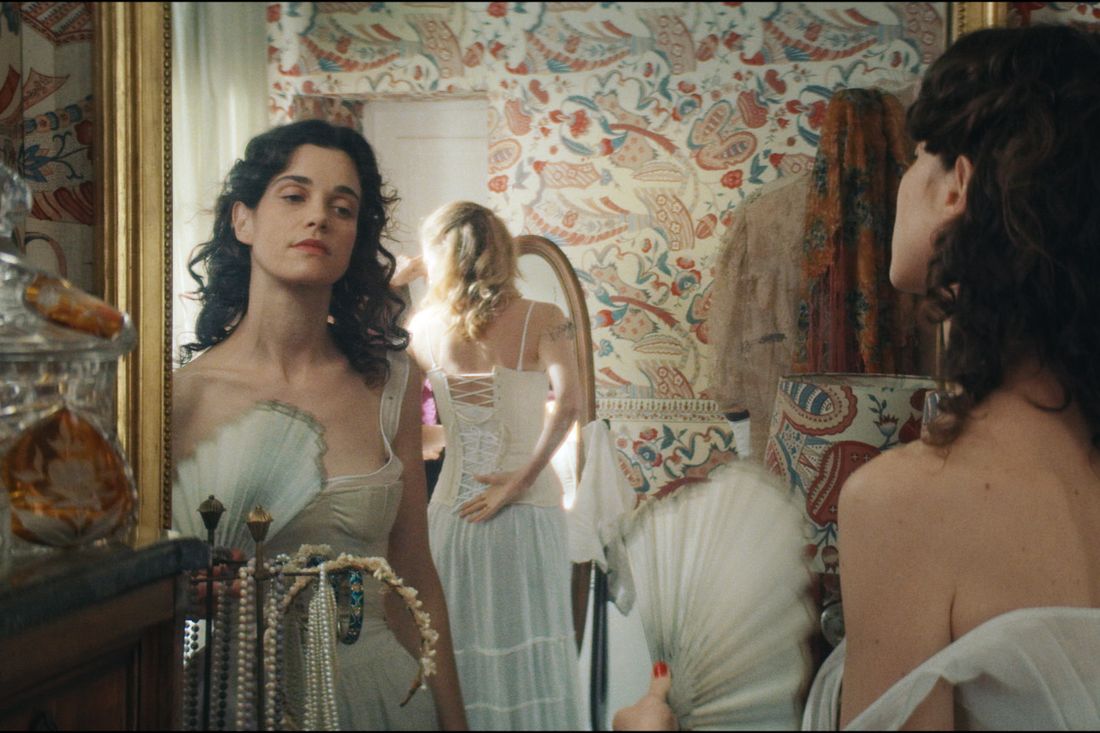
Though the title suggests that Laura Piani’s film Jane Austen Wrecked My Life focuses solely on literature, it also showcases a deep appreciation for nature. The movie beautifully blends themes of books, writing, ambition, and love with a strong sense of location. The story starts within the crowded, historic stacks of Shakespeare & Co. bookstore in Paris, yet it unfolds romantic complications amidst the damp greenery and dim lights of southern England (despite being filmed entirely in France). Essentially, this film is about finding one’s place, and it effectively immerses viewers in its captivating atmosphere.
The movie introduces its main character Agathe, portrayed by Camille Rutherford (recall her role as the journalist from Anatomy of a Fall), who is seen alone dancing and working at Shakespeare & Co., arranging books and occasionally glancing fondly at the romantic notes penned by customers on scraps of paper. (“You were wearing the burgundy dress and reading Vivian Gornick’s Fierce Attachments on the first floor. My only regret is that I didn’t have the courage to talk to you.”) Agathe resides with her sister and young nephew, a household formed since her parents perished in a tragic car accident. Despite being a gifted author, Agathe appears stagnant in her aspirations of becoming a renowned writer. Her confidante Felix (Pablo Pauly), who harbors feelings for her, covertly submits an application on Agathe’s behalf to the Jane Austen Writing Residency, hosted by the descendants of the celebrated author in England. She is accepted and decides to attend, albeit hesitantly. (She is hesitant about everything.) Just before boarding the ferry to traverse the English Channel, Agathe unexpectedly plants a passionate kiss on Felix.
Across the body of water, Agathe encounters Oliver (Charlie Anson), a somewhat haughty young man who’s related to the elderly couple managing the residence. Oliver appears critical, sarcastic, and brief. He confesses he isn’t particularly fond of Austen, despite being her great-great-great nephew; instead, he prefers Dickens. (Interestingly enough, he bears a resemblance to Hugh Grant – if Hugh Grant never smiled. Incredibly, this isn’t a negative trait.) Agathe and Oliver continue to cross paths in awkward situations, which means it’s only a matter of time before she finds herself in an Austen-esque dilemma: torn between the brooding Oliver, whom she feels attracted to, and Felix, who has already expressed interest in her. This kind of charming, romantic predicament was common in films long ago. Agathe muses that she’s living in the wrong era – she means the 19th century, but the movie itself seems outdated yet timeless, in a delightful manner.
This film’s significant aspect isn’t its plot, which follows a typical pattern. Neither is it the dialogue, as it tends to be straightforward and explicit in expressing themes and character traits. For instance, Felix tells Agathe, “You fear pain, love, casual encounters.” He continues, “You fear apps. You’re scared. You don’t live; you hide.” Later on, a writing teacher advises her, “Your work is shallow romance. Perhaps it’s time to explore new topics. You should adapt to the times.” Despite this straightforward approach, there’s a reason behind it all. This is the protagonist’s predicament: She’s aware of all her issues.
To combat the overwhelming self-reflection, Piani subtly creates an enchanting atmosphere of yearning within the disorganized gardens of the residence. As Agathe wanders among the fellow members of the writing group – poets, intellectuals, individuals who appear focused and resolute – she feels inadequate, and her vulnerability resonates with us. Rutherford is strikingly beautiful, yet she has a rough, insular nature, much like Anne Elliot from “Persuasion,” whom Agathe occasionally resembles, saying she’s “a spinster who has wilted like a flower that needs water.” (Everything just seems to sound better in French.) Agathe is concave not only physically but also spiritually, yet she fits perfectly within this subdued world of contemplative love, of lingering, uncertain glances exchanged between two hearts. By the end, abstract romance becomes something tangible and real – and we can’t help but develop feelings for these characters ourselves.
Read More
- Who Is Harley Wallace? The Heartbreaking Truth Behind Bring Her Back’s Dedication
- 50 Ankle Break & Score Sound ID Codes for Basketball Zero
- Here’s Why Your Nintendo Switch 2 Display Looks So Blurry
- 100 Most-Watched TV Series of 2024-25 Across Streaming, Broadcast and Cable: ‘Squid Game’ Leads This Season’s Rankers
- 50 Goal Sound ID Codes for Blue Lock Rivals
- How to play Delta Force Black Hawk Down campaign solo. Single player Explained
- Elden Ring Nightreign Enhanced Boss Arrives in Surprise Update
- Jeremy Allen White Could Break 6-Year Oscars Streak With Bruce Springsteen Role
- MrBeast removes controversial AI thumbnail tool after wave of backlash
- KPop Demon Hunters: Real Ages Revealed?!
2025-05-23 18:56